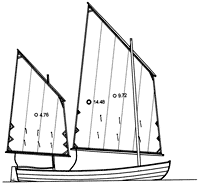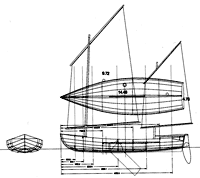A fresh breeze was blowing from the south-east, sending a fine-looking open sailing boat along her northerly course at a cracking pace. On board was a crew of two middle-aged men, who were enjoying the boisterous conditions despite their obvious tiredness. Both were wearing decent quality spray-jackets, but in other respects their clothing was a mixture of old workshop clothing, cloth hats, and worn sandshoes. The combination of mild temperatures, blue water, and green vegetation on the coastal outcrops far away to port, ensured that they felt content with their situation, even though their equipment was modest and their boat small.
The two-man crew had spent the last three hours taking turns at the tiller, and as the boat was so easily handled, the one not steering had been able to doze on the floorboards, make coffee, or just stare out over the wake (something impossible to become bored with). At this stage of proceedings, Mike Rowe was lying full-length on the floorboards with his head comfortably cradled by an inflatable fender, and his body well braced by the centreboard case on one side, and the nicely curved planking of the boat on the other. He loved this position, because it allowed him to stare up at the ever-changing sky while feeling the incredible feeling of buoyancy imparted by the floorboards against his back. The boat felt at home in the conditions, and the sound of rushing water against the plywood planking seeped deeply into his soul.
 |
The two-man crew had spent the last three hours taking turns at the tiller, and as the boat was so easily handled, the one not steering had been able to doze on the floorboards |
As Mike gazed up at the sky, he had an excellent view of the two sails, which stretched taut between their booms and their yards. The boat carried a Cat-Ketch rig (otherwise known as a Periauger rig) on two masts, both of which were completely free-standing and unencumbered by stays and shrouds. In fact, the only rigging required was a simple halyard and down-haul on each mast, and one sheet for each sail – you can’t get much simpler than that! Nothing on the rig required fittings bought from a chandlery – just bits of wood, rope, and cloth. The boat raced down the quartering waves in a thoroughbred fashion, and Mike was able to correlate the motion of the boat, the movements of the helmsman’s hands on the tiller, and the set of the sails. He tended to critisise his friend for lack of concentration while sailing (Mike being somewhat obsessive), but today he could relax and enjoy the ride, considering the favourable wind direction.
There had been many different discussions take place during the three-day beachcruising trip, but imaginary boats had been the most frequent subject. As usually happens in boat-dreaming, the size of the imagined boats became larger and larger, and Mike had to maintain strong discipline over his thoughts to prevent getting carried away with plans to build something too big. His friend was less strict with his thoughts, and fantasised about boats for extended journeys and family-sized crews. With this in mind, Mike suddenly yelled out, “Why would you ever want anything bigger than this?” The helmsman wiped a forearm across his face to remove the spray on his sunglasses and replied, “That’s not what you were saying last night when we were being eaten alive by mosquitoes, and you had sand in your sleeping bag! You said that you would give anything for a clean bunk and insect screens”. With that, Mike turned his attention back to the sky and continued his thoughts without bothering to reply.
As Mike gazed up at the sky, he had an excellent view of the two sails, which stretched taut between their booms and their yards. The boat carried a Cat-Ketch rig (otherwise known as a Periauger rig) on two masts, both of which were completely free-standing and unencumbered by stays and shrouds.
click images to enlarge |
 |
In Mike’s mind, the reality was that most people who are addicted to boat-dreams think about boats which are too big. He had seen so many examples of un-finished projects in various backyards that he was almost paranoid about over-ambitious plans. Too many times, people end up being burdened by complex and expensive boatbuilding projects, which nag and worry at their conscience long after the fun has gone out of the game. Even when a big boat gets finished, it often doesn’t get the use that the owner imagined would be the case. “Just go for a paddle around any big marina and you’ll see the story clearly”, he thought to himself.
In this electronic information age, it has become much easier for people to access information about boats and boatbuilding. Mike had found himself viewing some of the electronic offerings, and he had even been guilty of entering into one or two on-line debates - but generally he steered clear of forums. When asked why this was the case, he put forward the opinion that time spent on the net would be better employed in studying books, or better still, going out and building something. Several people had pointed out to Mike that he was just an opinionated snob, and that internet forums are an excellent method of communicating information. It had been put to him that the internet has provided access to information which had previously only been available to those with the correct books, or who were fortunate enough have a mentor. Mike understood the point, but he still thought that the endless on-line discussions distracted people from the real business of getting stuck into a building job.
 |
There is an old saying that goes, “The smaller the boat, the more she gets used”. Mike had another saying that went, “The simpler and smaller the boat, the more likely it is that the building job will get finished, and the more satisfaction the finished boat will provide”. |
However, I should get back to the subject of the discussion between Mike and his friend in the boat. There is an old saying that goes, “The smaller the boat, the more she gets used”. Mike had another saying that went, “The simpler and smaller the boat, the more likely it is that the building job will get finished, and the more satisfaction the finished boat will provide”. Talking aloud now, Mike questioned his sailing friend, “Which of your boats have you used the most over the years? You’ve got plenty in that backyard of yours”. The helmsman replied, “Either my Cartopper or my old KW10 paddle ski”. Mike grinned, sensing a victory, “And which one has given you the most satisfaction, considering that they are both tiny?”. “The ski,” said his friend, “but that is just because I’m too lazy to apply myself to the building process – there are plenty of people out there who get big boats finished and launched. However, the small boats are always there, ready to be used”.
It being obvious that there would be no end to this argument, Mike returned to his enjoyment of the moment. He had built this boat with his own hands, using simple tools, and she had cost him very little. The boat was strong and light, with lots of emergency buoyancy and storage spaces built-in. The sailing gear was simple, and just about anything in the boat could be fixed with a bit of rope or a piece of plywood and a squirt of bedding compound. The entire vessel could be towed by a small car, and could fit into a standard garage – yet she was capable of serious off-shore cruising (with an experienced and knowledgeable skipper). On the other hand an hour-long sail around a dam or a harbour was worth the effort, given the simplicity of the rigging and launching.
Mike thought to himself, “I know I might be an opinionated pain-in-the-butt, but I’ll stick with simplicity – life is too short for broken dreams.” |

